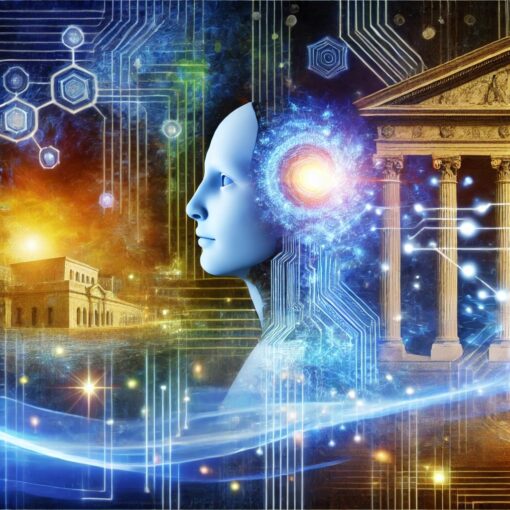Redefining Careers and Industries
Introduction: A New Era of Work
Artificial Intelligence (AI) is reshaping the workforce, automating tasks, and creating new opportunities. While some fear job displacement, AI also opens doors to roles that didn’t exist a decade ago. The future of work lies not in competition between humans and machines but in collaboration, adaptation, and innovation.
In this next chapter of the AI Terminologies Series, we’ll explore how AI is transforming careers, industries, and the skills needed to thrive in an AI-driven world.
1. The Changing Landscape of Jobs
AI’s Role:
AI is automating repetitive tasks, enhancing decision-making, and augmenting human capabilities, leading to shifts in job roles.
Industries Impacted:
- Healthcare: AI streamlines diagnostics and administrative tasks, allowing healthcare workers to focus on patient care.
- Finance: Automation handles data entry and fraud detection, while human analysts focus on strategy.
- Manufacturing: Robots and AI systems take over assembly lines, enabling workers to manage advanced machinery.
Emerging Roles:
- AI Trainers: Professionals who teach AI systems how to understand and respond.
- Data Curators: Experts who prepare high-quality datasets for AI models.
- Human-AI Interaction Designers: Specialists creating seamless AI-human interfaces.
2. Jobs at Risk and Jobs Evolving
At Risk:
- Data Entry Clerks: Automated systems handle large-scale data input.
- Retail Cashiers: Self-checkout systems and AI-enabled kiosks reduce manual cashier roles.
- Telemarketers: AI-driven chatbots handle customer outreach.
Evolving Roles:
- Software Developers: Transitioning to managing AI systems and no-code platforms.
- Teachers: Leveraging AI to personalize education and monitor student progress.
- Marketers: Using AI for targeted advertising and content creation.
3. Skills Needed for the AI-Driven Future
Technical Skills:
- AI and Machine Learning Basics: Understanding how AI systems work.
- Data Analysis: Interpreting data and deriving insights.
- Programming: Languages like Python, R, and SQL are essential.
Soft Skills:
- Adaptability: Embracing change and learning new tools.
- Collaboration: Working effectively with AI systems and multidisciplinary teams.
- Critical Thinking: Evaluating AI-driven decisions and ensuring ethical outcomes.
Lifelong Learning:
As AI evolves, continuous education will be key to staying relevant.
4. The Rise of AI-Enhanced Careers
AI is not just automating tasks but enhancing roles across industries:
- Healthcare: AI helps doctors analyze patient data for accurate diagnoses.
- Engineering: AI-driven simulations optimize product designs and processes.
- Journalism: AI tools assist in generating reports and analyzing large datasets.
Example:
Radiologists use AI to identify anomalies in medical images, speeding up diagnoses and reducing errors.
5. Gig Economy and AI
AI is reshaping the gig economy by providing tools for freelancers and independent workers:
- AI Platforms: Freelancers use AI for video editing, graphic design, and content creation.
- Remote Work: AI tools like scheduling assistants and virtual collaboration platforms enhance productivity.
- Gig Matching: AI platforms match freelancers with clients based on skills and project requirements.
Example:
Platforms like Fiverr and Upwork use AI to recommend jobs and freelancers, creating efficient matchmaking systems.
6. Ethical Considerations in the AI Workforce
As AI integrates into the workforce, ethical challenges must be addressed:
- Bias in Hiring Algorithms:
- Ensure AI-driven recruitment tools don’t perpetuate biases.
- Fair Compensation:
- Balance the economic benefits of AI with fair wages for human workers.
- Worker Privacy:
- Protect employees from invasive AI monitoring systems.
Solutions:
- Regular audits of AI systems.
- Transparent policies around AI usage in workplaces.
- Inclusive AI design involving diverse perspectives.
7. How Companies Are Adapting
AI Adoption Strategies:
- Upskilling Programs:
- Companies like Amazon offer AI training programs for employees.
- AI-Augmented Roles:
- Organizations integrate AI into existing workflows to enhance productivity.
- Flexible Work Models:
- AI enables remote and hybrid work setups.
Example:
Walmart uses AI for inventory management while training staff to manage AI-powered tools.
8. Preparing for the Future of Work
For Individuals:
- Learn AI Basics:
- Take courses on platforms like Coursera, edX, or Udemy.
- Experiment with AI Tools:
- Use AI platforms like TensorFlow, ChatGPT, or Canva’s AI features.
- Build a Portfolio:
- Showcase AI-driven projects to demonstrate your skills.
For Organizations:
- Invest in AI Training:
- Develop in-house AI training programs.
- Foster Collaboration:
- Encourage cross-disciplinary teams to explore AI applications.
- Adopt Ethical AI Practices:
- Ensure transparency and fairness in AI-driven decisions.
9. The Long-Term Outlook
- Human-AI Collaboration:
- AI will enhance human creativity and problem-solving.
- New Industries:
- AI will drive the emergence of industries we can’t yet imagine.
- Workforce Evolution:
- Jobs will become more dynamic, requiring constant adaptation and learning.
Conclusion: Thriving in an AI-Driven World
The future of work is not about AI replacing humans but about humans and AI working together to achieve more. By embracing AI as a partner, acquiring relevant skills, and staying adaptable, individuals and organizations can unlock unprecedented opportunities.
Stay tuned to Explore AIQ as we continue exploring how AI is transforming every aspect of our lives, from the workplace to society at large.




